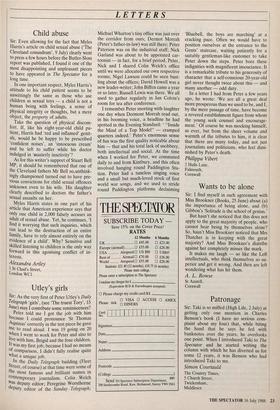Utley's girls
Sir: As the very first of Peter Utley's Daily Telegraph 'girls', (see 'The truest Tory', 15 June) may I contribute some reminiscences? Peter told me I got the job with him because I could pronounce 'St Thomas Aquinas' correctly in the test piece he gave me to read aloud. I was 19 going on 20 When I went to work for Peter and also to live with him, Brigid and the four children. It was my first job; because I had no means of comparison, I didn't fully realise quite what a unique job. In the Daily Telegraph building (Fleet Street, of course) at that time were some of the most famous and brilliant names in contemporary journalism. Colin Welch was deputy editor; Peregrine Worsthorne deputy editor of the Sunday Telegraph; Michael Wharton's tiny office was just over the corridor from ours; Dermot Morrah (Peter's father-in-law) was still there; Peter Paterson was on the industrial staff; Nick Garland was about to be appointed car- toonist — in fact, for a brief period, Peter, Nick and I shared Colin Welch's office until we were allocated our own respective rooms; Nigel Lawson could be seen bust- ling about the offices; David Howell was a new leader-writer; John Biffen came a year or so later; Russell Lewis was there. We all used to gather regularly in Ian Colvin's room for tea after conference.
I remember Peter snorting with laughter one day when Dermont Morrah read out, in his booming voice, a headline he had spotted in the Evening Standard: "Inside the Mind of a Top Model" — cramped quarters indeed.' Peter's enormous sense of fun was the first quality noticable about him — that and his total lack of snobbery, both intellectual and social. At the time when I worked for Peter, we commuted daily to and from Kintbury, and this often involved hanging round Paddington Sta- tion. Peter had a tuneless singing voice and a small but much-loved stock of first world war songs, and we used to stride round Paddington platforms declaiming 'Bluebell, the boys are marching' at a cracking pace. Often we would have to position ourselves at the entrance to the Gents' staircase, waiting patiently for a suitably gentleman-like customer to take Peter down the steps. Peter bore these indignities with magnificent insouciance. It is a remarkable tribute to his generosity of character that a self-conscious 20-year-old girl never thought twice about this — and many another — odd duty.
In a letter I had from Peter a few years ago, he wrote: 'We are all a great deal more prosperous than we used to be, and I, by the mere passage of time, have become a revered establishment figure from whom the young seek counsel and encourage- ment.' Of course he was mocking himself, as ever, but from the sheer volume and warmth of the tributes to him, it is clear that there are many today, and not just journalists and politicians, who feel dimi- nished by Peter's death.
Philippa Vibert
2 Hulls Lane, Falmouth, Cornwall


















































 Previous page
Previous page